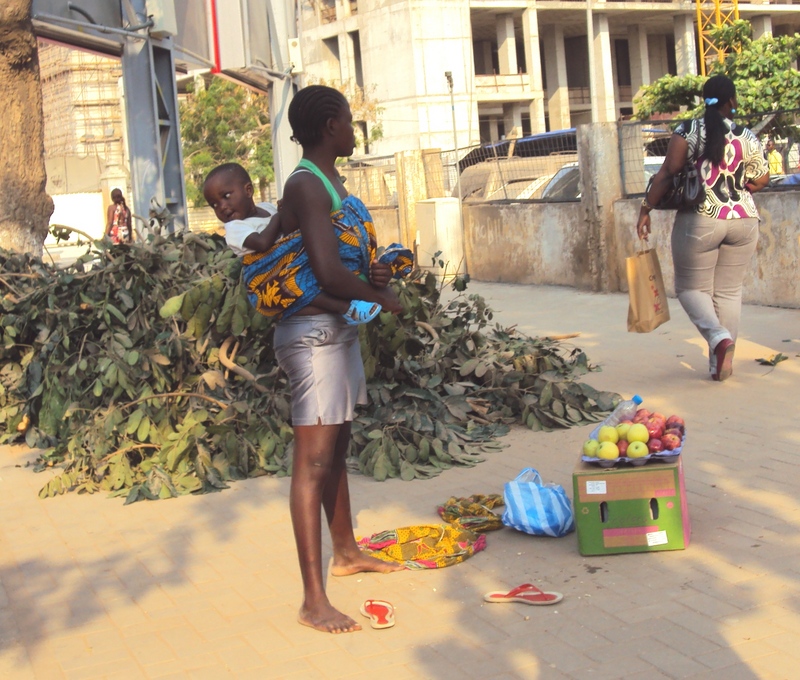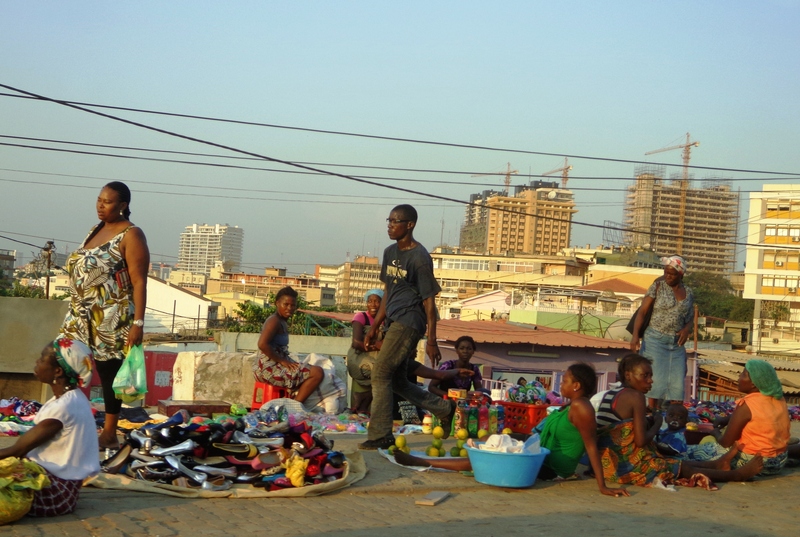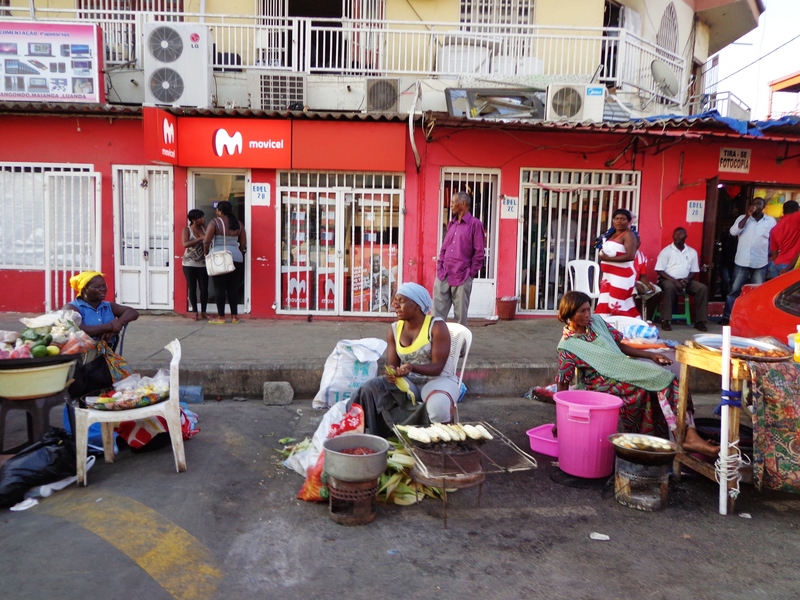In a move aimed primarily at improving the image of Luanda, Angola's capital and largest city, the government of this Southern African country announced a controversial measure: from now on, it would be illegal to engage in street trading in Luanda. Buyers as well as sellers would be fined.
Street sellers have been a way of life in Luanda since colonial times [pt], and there are several songs from well-known national musicians that celebrate this particular part of the culture. These men and women sell just about anything and everything on the streets.
Angola is currently one of Africa's strongest economies and is enjoying new-found wealth coming primarily from its oil industry. However, the wealth does not trickle down to the great majority of Angolans, and the country has maintained one of the worst social inequality levels in the world.

“Fruits vendor on a street near the Alvalade Hotel (Average price per room per night 450 US dollars). You can't find a decent hotel room in Luanda for less than 400 US dollars/night. A basic lunch in a decent restaurant (Just one course meal and a bottle of still water) will cost you about 75. The poor are finding harder and harder to manage to survive here.” Photo and caption by Ionut Sendroiu copyright Demotix (8 October 2010)
“The Governor of Luanda Fights Street Vendors” [pt] was the title of one of the most liked and shared posts last week by Mana Mingota (Sister Mingota, in English), one of Angola's most popular Facebook pages. A fictitious character, almost no one knows who is behind it. Yet the page, which posts advice, humor, and commentary about a diverse range of subjects that appeal to the country's younger, Internet-active generation, has nearly 76,500 fans – more than most well-known brands and celebrities in Angola.
The post reads:
Tantos problemas para combater, água, luz, saneamento básico, emprego para os jovens, falta de casa, comida cara, prostituição legalizada, venda de bebidas a menores de idade, consumo exagerado de álcool pela população, acidentes de viação, falsificação de documentos, burocracia na emissão de documentos, propinas elevadas das universidades privadas, gasosas nos polícias, corrupção nas escolas, mau atendimento das repartições públicas, ene problemas, e a sua excelência senhor governador está com todas flechas apontadas para as zungueiras que com sacrifício tentam ganhar a vida para alimentar famílias e colocar os filhos na escola para não virarem delinquentes. Sinceramente muitos aqui pensam ao contrário!!!
So many problems to resolve – water, electricity, basic sanitation, employment for the youth, lack of housing, expensive food, legalized prostitution, the sale of alcohol to underage kids, an exaggerated consumption of alcohol in our society, motor vehicle accidents, document falsification, bureaucracy in the emission of new documents, high cost of education in private universities, police corruption, corruption in schools, horrible public service, so many problems and his Excellency the governor has all guns pointed at the street vendors who make many sacrifices and are just trying to earn some money so that they can feed their families and put their kids through school so that they don't turn into criminals. Seriously, a lot of people here think backwards!!!
The banning of street traders – or zungueiras, as they are locally known – appears to be part of a larger effort to hide Luanda's poor and dump them in the city's outskirts. Out of sight and out of mind, if you will. Besides zungueiras, inhabitants of Luanda's sizeable slums are also frequently awakened by the sound of bulldozers razing their homes to the grounds without prior warning, and then they are taken on buses to land without basic livable conditions.

“For most of the inhabitants, the skyscrapers of Luanda mean nothing but a background.” Photo and caption by Ionut Sendroiu copyright Demotix (8 October 2010)
Due to a variety of factors including a prolonged civil war and notoriously low investment in education, the majority of Angola's workforce is unskilled and over a quarter are unemployed.
According to the recently released “Bertelsmann Stiftung, BTI 2014 Angola Country Report” [pdf], which covers transformation towards democracy and market economy in 129 countries:
[…] the population in [Angola's] cities often depends on informal commerce to make ends meet. This is especially the case in the capital Luanda, where an estimated one-third of the population lives, and which is alone responsible for 75% of GDP production.
The same report states that 70 percent of the informal workforce is made up of women. Invariably, the government's latest policy will adversely impact women, who are the most vulnerable in these sorts of cases. And it didn't take long. The anti-corruption watchdog Maka Angola recently reported that nearly 50 women, children and men were detained, some for three days, in the same cell in a Luanda police station for being caught selling goods on the street.
But this is nothing new. As Louise Redvers states in an article published last week examining this same issue on the website of Open Society Initiative for South Africa:
[…] worse still, these women are regularly abused by exploitative police officers and government inspection teams, who beat them, steal or damage their goods and subject them to bribes. You can read more about the scale of this horrific abuse – and the seeming impunity of the officials involved – in this damning Human Rights Watch report released last September.
Popular reaction to the government's latest measure has been one of incredulity mixed with widespread condemnation, but it's important to note that not everyone thinks this way. Many have applauded the government's decision, saying that street selling was getting out of hand and that it was detrimental to the city's image. And I've seen how zungueiras can turn any empty patch of concrete or asphalt into an unsanitary open-air market.
But as Angolan rapper MCK sings:
em vez de combater a pobreza estão a combater os pobres.
Instead of fighting poverty they are fighting the poor.
Street selling is not the problem – rather, it is the effect of a much larger issue, which is the government's inability to address the massive gap between the haves and the have-nots. It is the government's inability to address poverty despite the huge oil riches that the wealthiest Angolans are enjoying. And it is their mistaken belief that the way to deal with poverty is by hiding it.
A quote in Louise Redvers’ piece cited above is particularly eye opening:
I remember very clearly one very well-dressed and expensively US-educated Angolan oil worker telling me: “We can’t have these people on our streets anymore, not in the city centre next to places like Sonangol. We need to improve our image, we are a modern country, these people can’t be here like this.”
Angola is a country where the National Registry is closed for four days because there's no “system” (read: intranet). Where a routine Western Union or Moneygram transfer can take several trips and several hours. Where there is no reliable water or electricity distribution. Where the government is incapable of providing even the most basic services to its population. Where the government spends only a small fraction of its budget on health and education, amongst the lowest figures in Africa. Where corruption is a way of life and where the government has forgotten its promise from independence that the most important thing to do was to resolve the people's problems.
The zungueiras and the country's poorest will continue to bear the brunt of this image-conscious makeover until more serious policies aimed at reducing poverty and giving the poor another option to sustain themselves are enacted.
Also read Clara Onofre's post on Global Voices (2008): Angola: Hawkers face a hard life with dignity and courage









7 comments
“End Human bankruptcy”an idea whose time has come.Peoples deserve Your Time,Thought,and Consideration.Then Action taken with viable ideas! Theirs
Hello. I am SELL DUMPS t1 and t12
Benefits:
– First hand dumps.
– Fresh updates weekly.
– Low prices.
Rules:
– I don’t sell dumps with pin.
– I don’t give any free test.
– Instant delivery and replace system!
– Prices negotiable for large quantities.
– Refund time – 24hr!
– Accepted payment methods :BTC, PM, MG & WU.
– For any other questions contact me in ICQ: 651907609
Prices:
USA
VISA,Master CLASSIC/Standart $10
GOLD,PLATINUM, PREMIER $15
BUSINESS/CORP/ $20
Signature/infinity $25
Master World $25
DISCOVER $15
DISCOVER EU $20
Amex Usa all $15
Amex EU all $35
=================================
101 EU
classic / standart 60 usd
gold / platinum 80 usd
bus / corp 90 usd
infinite 110 usd
canada 101
classic / standart 18 usd
gold / platinum 25 usd
bus / corp 33 usd
infinite – 40 usd
201 eu and other
classic / standart 45 usd
gold / platinum 65 usd
bus / corp 80 usd
infinite – 115 usd
canada 201
classic / standart 15 usd
gold / platinum 18 usd
bus / corp 30 usd
infinite – 35 usd
*********************
LOW base:
——————-
EU all type 10 usd
canada all 5 usd
USA all type 3 usd
#########################